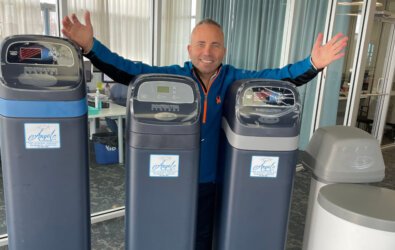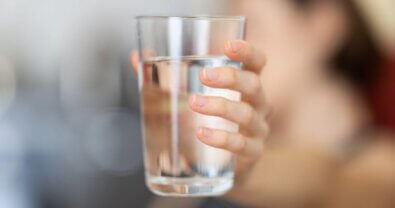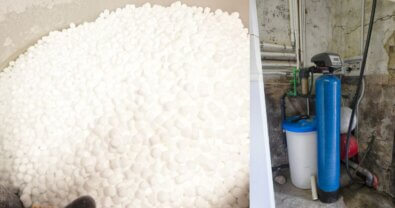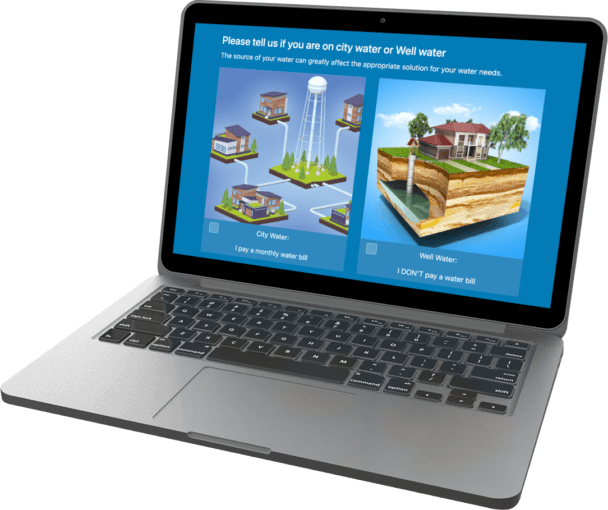What Do I Need to Know About Water Conditioning Systems?
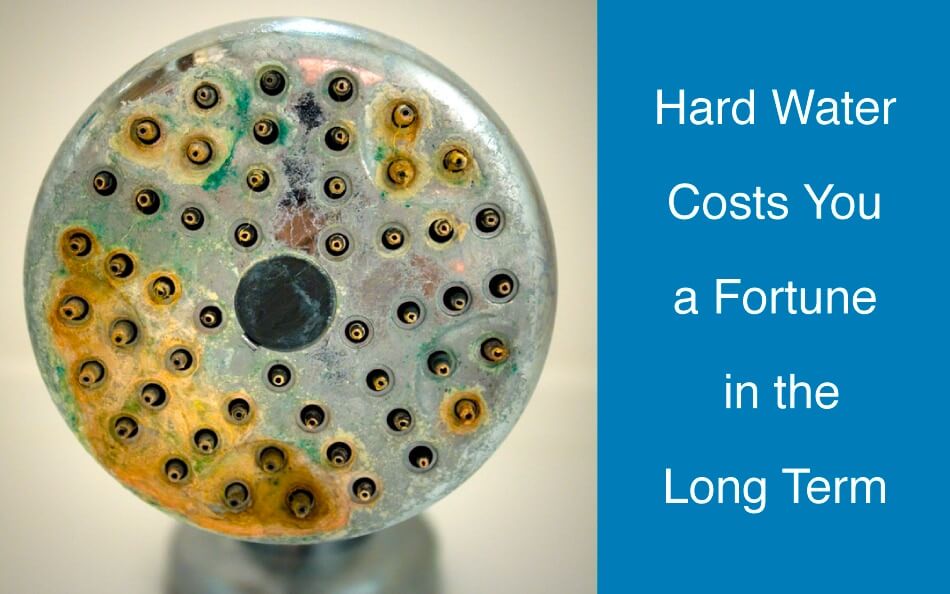
In this blog, we delve into the fundamentals of water conditioning systems, from how they tackle hard water and radium contamination to how they can save you money. We also provide guidance on selecting the right system for your needs.
Here’s a Breakdown of the Basics of Water Conditioning Sytems
Water treatment is a massive, extensive topic because every region’s water has different issues. As a result, each region’s water demands different equipment to treat it as well. In the United States, though, one issue affects nearly everyone: hard water. That’s why practically all Americans need water conditioning systems in their homes.
Surprisingly, even though 85% of U.S. households grapple with hard water, less than 30% have invested in water softeners. This means that there’s a good chance you’re missing out on a valuable solution for your water issues.
Similarly, nearly 90% of groundwater in the Midwest is contaminated with radium. Water conditioning systems can resolve this issue, yet only one in five Americans has one in their home.
To help fix this and narrow that gap, we at Angel Water have put together this beginner’s guide to water conditioning systems. Read on to learn about the effects of hard water and radium, the benefits of water conditioning systems, and what to look for when choosing one.
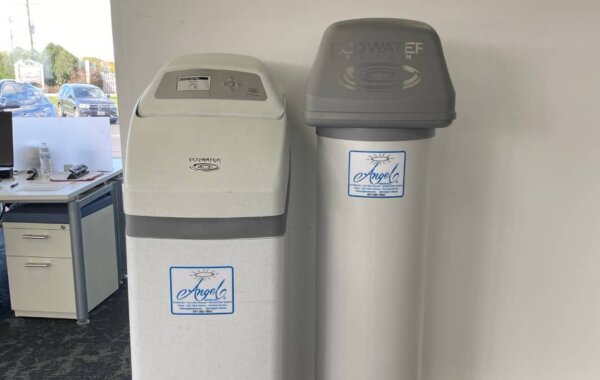
What Is Hard Water?
You may be thinking, “How can water be hard? It’s a liquid!” However, water hardness doesn’t mean the water is literally hard. Instead, it’s a measure of the water’s mineral content.
When water in the environment passes through soil and rocks, it picks up many different particulates. Among these are minerals like calcium and magnesium. An excess of these minerals is what we call “hard water.”
The United States is located in a region primarily consisting of ancient seabeds with high concentrations of limestone. As a result, most water in the U.S. passes through this limestone at some point, and 85% of people in the U.S. have hard water in their homes.
Here in Northern Illinois, we’re in a region of extreme water hardness. Chicago’s water has a hardness of approximately 8 grains per gallon, well into the range we consider “hard.” This is why water conditioning systems are essential here and throughout the Midwest.
What Are the Effects of Hard Water?
Whenever you use hard water, the excess minerals are left behind in a residue, clinging to whatever surface they touched. They form scales and mineral deposits, which have different effects depending on how the water is being used.
Here are the ways hard water negatively affects your body, inconveniences you, and costs you money.
Hard Water Harms Your Skin, Scalp, and Hair
The calcium and magnesium in hard water have a positive charge. Your skin, scalp and hair have negative charges. As a result, the minerals cling to you after the water flows away. It’s hard to rinse them out—if you have a flakey scalp, calcium particles may come loose, not just dead skin.
What does this do to your body?
- Your hair gets dried out and frizzy after a shower
- Your skin gets dry and itchy after showering
- Researchers say excessive hard water exposure may cause children to develop eczema. This chronic skin condition features itchy, scaly, inflamed sores, affecting 31.6 million Americans.
If you suspect your water is giving you skin problems, read our more detailed breakdown of this issue here.
Hard Water Makes Cleaning More Frustrating
Hard water affects not only your body but also your daily life. Here are some of the other ways hard water will inconvenience you in the bathroom, kitchen and laundry room:
- Because your hair and skin get dried out, you must use more products to wash, condition and moisturize. This further damages your hair and scalp and pulls you into a cycle of drying yourself out and using too much of those products.
- Hard water neutralizes soaps, making them less effective. This creates soap scum stains in your sinks and bathtub.
- There may be a cloudy film left on your dishes after you wash them.
- Similarly, your clothes may come out of the laundry faded and discolored.
- In extreme cases, mineral deposits can clog water-using appliances like coffee machines and dishwashers.
Hard Water Costs You a Fortune in the Long Term
In addition to making you itchy and leaving a film on your dishes, hard water will also rob you of thousands of dollars over the years if you don’t act.
Here are the ways that hard water is costing you money:
- Hard water scaling builds up in your pipes and appliances, reducing water flow and efficiency—especially in your water heater. It’s estimated that 5 grains of hardness reduce efficiency by 8%, and one study found that extremely hard water can reduce efficiency by as much as 48%. That’s hundreds of dollars lost every year.
- Having hard water means your dishwasher needs more soap. High-end dishwashers even include a self-contained water softener, meaning hard water makes you pay a premium for clean dishes.
- Fixtures can get clogged due to hard water buildup—for example, your faucet’s blending valve. This means you’ll need to pay for a service visit to fix it.
- Because hard water neutralizes soaps and reduces their effectiveness, you must use more to get the same clean. You’re probably spending far more than necessary on cleaning supplies like dish soaps and detergents and personal hygiene products like shampoo and body wash. That’s hundreds of dollars a year literally going down the drain.
For a more complete roundup of how much of your hard-earned money hard water costs you, read our summary here.
How Do Water Conditioning Systems Help with Hard Water?
Water conditioning systems remove the excess minerals that create hard water. A water conditioning system might utilize several processes, the most prominent being ion exchange, but in any case, the result is removing those minerals.
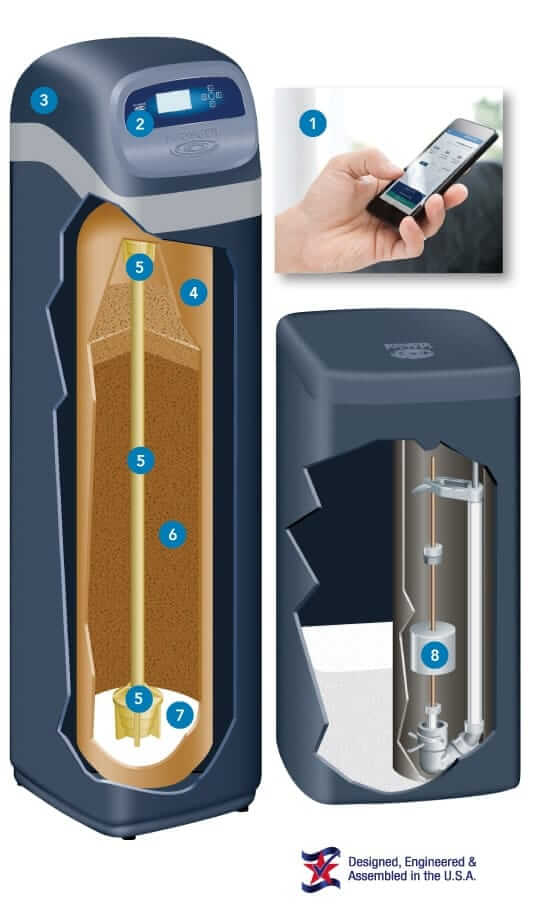
For you, that means a variety of benefits:
- Healthier skin and hair
- Hands feel softer and less dried out after washing
- Use less soap and shampoo in the shower
- Use less cleaning products around the house
- Clothes don’t get discolored or faded as easily
- No more soap scum stains on sinks, tubs, and toilets
- No spots or films on dishes
- Appliances like water heaters, coffee pots, and humidifiers will last longer
- Those appliances also work more efficiently, resulting in lower energy bills
- Mineral buildup in pipes won’t reduce water flow from fixtures
What Is Radium?
In addition to hard water, radium is another common water issue in this region that many water conditioning systems can resolve. Radium is a naturally occurring radioactive element in the Earth’s crust, which is common in the region’s groundwater and has severe long-term health consequences.
Here in the Midwest, radium is found in 90% of water drawn from private wells. Cities like Barrington, Bartlett, Elgin and Lake Zurich source their water from the ground, so their drinking water also contains elevated radium levels. This is why water conditioning systems are essential for both well water and municipal water users.
What Are the Effects of Radium Exposure?
Once radium enters your body, you store it in your bones. Your body does this with all radioactive elements and heavy metals that it can’t process. As a result, radium doesn’t harm you immediately—instead, the danger comes with excessive long-term exposure over many years and many glasses of water.
So, what are the symptoms associated with this long-term exposure? Well, according to the Water Quality Association (WQA):
“Radium in drinking water is of primary concern because this radiation may cause cancer, kidney damage and birth defects. Additionally, the decay of radium into radon presents another contaminant of health concern in drinking water and the air. The National Academy of Sciences reported that exposure to radon in the air is the second cause of lung cancer next to cigarette smoking.” –WQA Technical Fact Sheet: Radium
How Do Water Conditioning Systems Help with Radium?
According to the EPA, the ion exchange process used by many water conditioning systems will remove radium from your water. In fact, according to the Illinois Department of Health, ion exchange can remove as much as 97 percent of the radium in your drinking water. With that reduction, it’s doubtful you’ll ever accumulate enough radium in your body for it to affect your health.
For a deeper explanation of how a water softener protects you from radium, read our report here.
How Do I Choose the Right Water Conditioning System?
As with all water treatment equipment, there’s a huge market for water conditioning systems, and every manufacturer wants to be the one who gets your hard-earned money. As a result, the market is full of manufacturers putting out conflicting information and competing claims as to what makes a good water softener.
To navigate this market, you need standards to measure a product’s quality. That’s where NSF International comes in. This widely respected independent organization tests, inspects and certifies all sorts of sanitation products.
When water conditioning systems are NSF-certified, the manufacturer has invested thousands of dollars in extensive testing to meet rigorous industry standards. These products have been proven to work the way they claim, run more efficiently and are built to last.
Angel Water installs, maintains, and repairs NSF-certified water conditioning systems from EcoWater, including the ECR-3702, ESD-2502, and EEC-1502. With these products, you know they’ve been held to a high-quality standard and proven their claims. That’s how you know you’re getting the best bang for your buck.
For a more complete breakdown of the importance of certifications, read through our explanation here.
How Do I Maintain or Repair My Water Conditioning System?
As with all water treatment equipment, water conditioning systems require regular maintenance to keep them working efficiently. That’s why you should schedule service visits from a professional technician at least annually.
About 53% of insurance claims result from appliance-related water damage to homes. Don’t put off maintenance for years until your water system fails—or you’ll be paying more than you would for the service visits!
Other small maintenance tasks and fixes can be completed independently, such as adding salt or setting the timer.
For instructional videos and how-to tutorials on how to complete those tasks, visit the Angel Water YouTube channel!
If you suspect you may have hard water or radium, are looking at water softeners for your home, want to schedule service visits, or have any other questions or concerns about water softeners, give Angel Water a call at 847-382-7800. We’ve been installing and servicing water softeners in Barrington, IL and the greater Chicago area for decades, and our qualified water professionals are always happy to educate our community members about keeping our water clean and safe.
Schedule A Service Visit for Your Water Conditioning System Today!
If you suspect you may have hard water or radium, are looking at water conditioning systems for your home, want to schedule service visits or have any other questions or concerns about water conditioning systems, call Angel Water.
We’ve been installing and servicing water conditioning systems in Barrington, IL, West Palm Beach, FL, and the surrounding areas for decades, and our qualified water professionals are always happy to educate our community members about keeping our water clean and safe.
Interested in a Water Softener System for Your Home?
You don’t have to live with a dry, itchy scalp and brittle hair anymore! It would be our pleasure to help you find the right water softener to make your showers enjoyable again.
Please give us a call at (847) 382-7800 or visit our water softener page to learn more.

